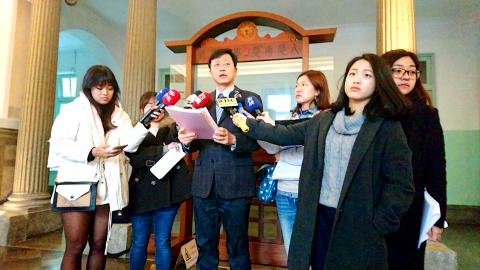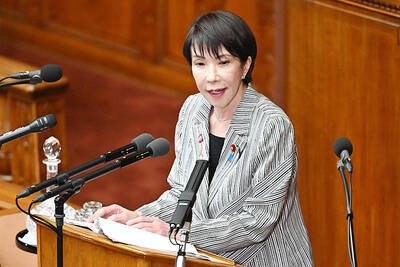National Taiwan University (NTU) yesterday released stage-two investigation results on an academic fraud scandal involving professor Kuo Min-liang (郭明良), which saw the university move to fire Kuo and professor Chang Cheng-chi (張正琪), while clearing NTU president Yang Pan-chyr (楊泮池), who cowrote four problematic papers published by Kuo’s team.
Two internal investigation teams and an investigation committee comprising members from outside the institution found that Kuo’s research team presented a host of misleading images in six papers, of which two have been retracted by science journals Nature Cell Biology and the Journal of Biological Chemistry.
The sheer number of problematic images was proof that Kuo “purposefully” added them to the papers, the report said.

Photo: Hsiao Yu-hsin, Taipei Times
The problems manifested in 2006, when Kuo — as the papers’ corresponding author — was responsible for supervising research work, but he chose to neglect the issue and involved a number of his graduate, doctoral and postdoctoral researchers in the presentation of more errors, it said.
The university decided to dismiss Kuo, who should assume “the greatest and ultimate responsibility,” it said.
Chang, whose name was absent from the first-stage investigation results, duplicated and improperly edited several images in four papers, including the 2008 article, of which she was the lead author, the investigation found.
She has been disqualified as a professor, dismissed, barred from re-applying for a teaching position at the university for five years and prohibited from requesting research grants from the school for five years.
Yang, who coauthored four problematic papers, “bears no responsibility” for the falsified data presented in the papers and therefore “has no reason to resign,” the university said.
In a 19-page report, the committee said Yang only provided some general advice on the direction of the research and his clinical insights on the four papers.
Yang’s involvement was limited to the parts he contributed and coauthors were responsible for checking their contributions to the paper, the committee said.
“By a vote of six to zero, our committee concluded that, based on Ministry of Science and Technology regulations, Dr Yang bears no responsibility for the manipulated figures that mainly involve immunoblots,” the committee said.
One of the questions the committee said it assessed was whether Yang should resign in the way former Minister of Education Chiang Wei-ling (蔣偉寧) did over an academic misconduct scandal 2014.
The question has been raised by educators who called for Yang to step down.
Chiang was unknowingly listed by his former student Chen Cheng-wu (陳震武) as a coauthor in a fake online peer review ring Chen helped create in an attempt to have work published by international journals.
Yang’s case fundamentally differs from the earlier case in the nature and the magnitude of the offense, the committee said.
“Therefore, we feel that it is inappropriate to suggest that, based on this earlier case, President Yang should resign,” it said.

Taiwan’s exports soared to an all-time high of US$61.8 billion last month, surging 49.7 percent from a year earlier, as the global frenzy for artificial intelligence (AI) applications and new consumer electronics powered shipments of high-tech goods, the Ministry of Finance said yesterday. It was the first time exports had exceeded the US$60 billion mark, fueled by the global boom in AI development that has significantly boosted Taiwanese companies across the international supply chain, Department of Statistics Director-General Beatrice Tsai (蔡美娜) told a media briefing. “There is a consensus among major AI players that the upcycle is still in its early stage,”

‘SECRETS’: While saying China would not attack during his presidency, Donald Trump declined to say how Washington would respond if Beijing were to take military action US President Donald Trump said that China would not take military action against Taiwan while he is president, as the Chinese leaders “know the consequences.” Trump made the statement during an interview on CBS’ 60 Minutes program that aired on Sunday, a few days after his meeting with Chinese President Xi Jinping (習近平) in South Korea. “He [Xi] has openly said, and his people have openly said at meetings, ‘we would never do anything while President Trump is president,’ because they know the consequences,” Trump said in the interview. However, he repeatedly declined to say exactly how Washington would respond in

Japanese Prime Minister Sanae Takaichi said yesterday that China using armed force against Taiwan could constitute a "survival-threatening situation" for Japan, allowing the country to mobilize the Japanese armed forces under its security laws. Takaichi made the remarks during a parliamentary session yesterday while responding to a question about whether a "Taiwan contingency" involving a Chinese naval blockade would qualify as a "survival-threatening situation" for Japan, according to a report by Japan’s Asahi Shimbun. "If warships are used and other armed actions are involved, I believe this could constitute a survival- threatening

WARFARE: All sectors of society should recognize, unite, and collectively resist and condemn Beijing’s cross-border suppression, MAC Minister Chiu Chui-cheng said The number of Taiwanese detained because of legal affairs by Chinese authorities has tripled this year, as Beijing intensified its intimidation and division of Taiwanese by combining lawfare and cognitive warfare, the Mainland Affairs Council (MAC) said yesterday. MAC Minister Chiu Chui-cheng (邱垂正) made the statement in response to questions by Democratic Progressive Party (DPP) Legislator Puma Shen (沈柏洋) about the government’s response to counter Chinese public opinion warfare, lawfare and psychological warfare. Shen said he is also being investigated by China for promoting “Taiwanese independence.” He was referring to a report published on Tuesday last week by China’s state-run Xinhua news agency,